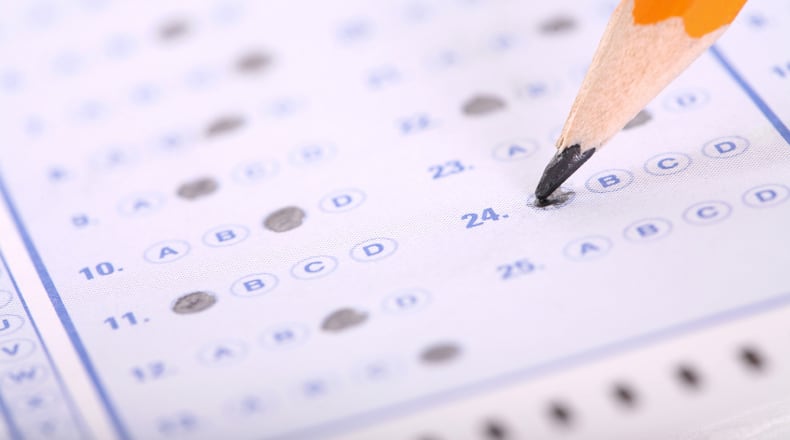Short and simple, House Bill 425 seems straightforward, but it could create complex problems for school districts with its opt-out protections and its push for pencil and paper testing alternatives.
Passed easily by the House Friday and en route to the Senate, the bill contains tempered language at this point, although there's at least one important "shall" in the mix.
Here is what the bill now does:
1. It encourages local school systems to give students the option of taking online assessments with a paper and pencil instead.
Why is that a problem?
The state of Georgia is in the process of moving all students to online assessments. That changeover has not gone as smoothly as the state Department of Education wanted, particularly in Fulton County last year. DOE wants online exams to speed up grading so schools find out earlier which students require retests or summer school.
Some parents contend their young children perform better with pencil and paper than with keyboards, and they want a choice. Now, many districts limit that option to students with a proven disability.
Concerns about the testing mode -- pencil and paper vs. online -- are increasing as more states put kids in front of computers to take their high-stakes assessments. Some evidence shows a learning curve, with students scoring lower in the transition years to online testing.
As Education Week reported last year: Students who took the 2014-15 PARCC exams via computer tended to score lower than those who took the exams with paper and pencil—a revelation that prompts questions about the validity of the test results and poses potentially big problems for state and district leaders.
My view: Online assessments measure student proficiency in two areas, their grasp of the material being tested and their computer fluency. Writing a tough essay becomes tougher if students lack computer competency.
I discussed this issue with another education writer who countered: We're not going back. Kids will take tests on computers and quickly grow comfortable with it, as have college students. Students today are tech savvy earlier and earlier; they will get the hang of online assessment, and it will become the standard.
2. The bill also instructs Superintendent Richard Woods to identify policies for local school systems to adopt when deciding how students opting out of Georgia exams will be supervised and, what, if any, alternative to the exams will be provided to them during the test administration.
The bill states that the guidelines "shall" prohibit a school system from "taking punitive action against a student, including, but not limited to, the adoption of sit and stare policies, in response to a student's refusal to participate in a federal, state, or locally mandated standardized assessment."
The bill defines "sit and stare" as any policy that requires students sitting out a test "to remain with their class in the test room or in another location without any alternate instructional activity."
Why is this a problem?
Testing weeks in schools already necessitate all-hands-on-deck. So, there may not be spare teachers available to provide "alternate instructional activities."
Georgia imposed statewide tests because it wanted districts held to the same standards. It needed a basis of comparison to know that the algebra taught in Austell was the same as what was taught in Albany or Acworth. And the state uses its Milestones and End of Course tests to gauge how well schools are performing.
If opting out of tests is encouraged and protected, as HB 425 attempts, more parents may choose to pull their kids out of tests. That will make it harder to compare districts -- if you think test-based comparisons are valid in the first place -- and it will render it near impossible to grade districts based on scores.
The End of Course tests count for 20 percent of final high school grades. If Georgia makes it easier to opt-out and more families do, would teachers have to offer another final project or performance measure for kids to replace the EOCT score?
The head scratcher to this legislative zeal to liberate students from standardized tests: Elected officials at the state and federal levels imposed mandatory tests on schools. Lawmakers in Georgia chose to make the tests count toward final grades in the high schools.
Now, they're shredding their own handiwork, but leaving schools and teachers to patch it back together.
About the Author
Keep Reading
The Latest
Featured



